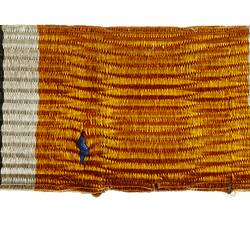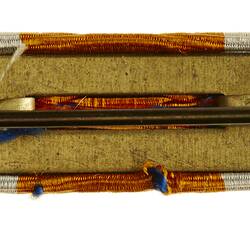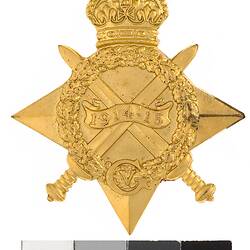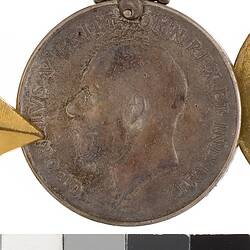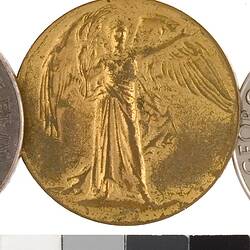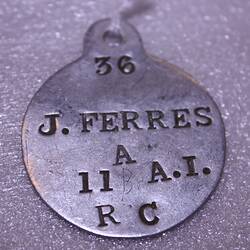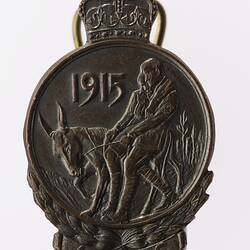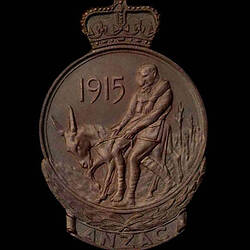Summary
Riband Bar relating to the 1914-15 Star, British War Medal and Victory Medal ribbons and representing medals awarded to Private Joseph Ferres, service number 36, 11th Battalion, A.I.F.
Private Ferres was a 29 year old farmer when he joined in Western Australia on 26 August 1914. He embarked on the 2 November 1914 from Fremantle, Western Australia on the ship HMAT Ascanius A11. Ferres served in Gallipoli, and was awarded a medal to commemorate the 50th anniversary of the Anzac Gallipoli landings in 1967. He served until 13 February 1917.
Riband bars are small sections of the coloured ribbon from which individual medals are mounted or suspended. (Each medal is presented with its own distinctive ribbon.) The ribbon sections of a riband bar are lined up next to each other and usually fixed to a pin so they can be worn like a badge wiith everyday uniform where medals are not required.
Physical Description
Long, narrow, horizontal badge covered with three sections of vertically striped ribbons positioned next to each other.
Obverse Description
Riband bar with three ribbons. First ribbon section represents the 1914-15 Star ribbon. It has shaded red, white and blue vertical stripes representing the British Empire. The second ribbon section is the British medal ribbon that has a vertical, centrally positioned wide orange stripe flanked on either side by two white stripes, flanked by two black stripes, flanked by two blue stripes on the outside edges. The third ribbon section is the Victory medal ribbon that has colourful vertical stripes similar to a rainbow. A vertical, centrally positioned wide red stripe is flanked on either side by two shaded yellow stripes, flanked by two shaded green stripes, then two shaded blue stripes and finally two shaded violet stripes on the outside edges.
Reverse Description
There is a pin attached to the back.
More Information
-
Collecting Areas
-
Acquisition Information
Donation from Mrs H V Ferres
-
Awarded To
-
Place
Gallipoli Peninsula, Turkey, 1915
Bar receipent was wounded in Gallipoli -
Classification
-
Category
-
Discipline
-
Type of item
-
Shape
Rectangle
-
References
References: Australian War Memorial website [Link 1] National Archives of Australia website: [Link 2] Researched by Deb Tout-Smith, 12/01/2004; J. Sharples 7 June 2011 Australian Army website: [Link 3]
-
Keywords

